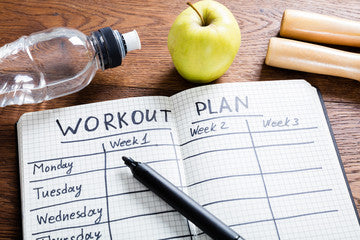Obesity is a global problem that affects not only physical health but also mental health. Depending on the severity, obesity can be associated with an increased risk of all-cause mortality as well as various organic and metabolic diseases such as diabetes, hypertension, liver disease, sleep apnea or arthritis (1). In addition, obesity often leads to psychological problems such as sadness, depression or loss of motivation (2). In the worst case, it can create a vicious cycle in which these bad feelings lead to trips to the fridge more often. This is called “emotional eating” (3). To make matters worse, social media users are exposed to posts under hashtags like #cleaneating or #fitspiration, which can increase negative feelings about themselves, according to a new study (4).
If you have managed to lose weight against all odds, now the real obstacles await you. Studies conducted after weight loss programs show that only 25% of people are able to maintain their weight long-term (5, 6).
Enough negative headlines
Successful and sustainable weight loss requires willpower, clear goals, persistence and good strategies.
The internet is full of good advice, but in practice I find that the same nutritional mistakes happen again and again. Today I would like to introduce you to five of these mistakes that I repeatedly notice in my active practice as a coach.
BE SMARTER AND AVOID THEM
1. Don't trust your feelings
A “basic law of losing weight” can be found in the calorie balance model. Although this concept also has major weaknesses (you've probably heard clever sayings like "All calories are the same" or "As long as you're in a deficit, you'll lose weight"), it's still considered essential to go into a calorie deficit to successfully lose weight to signal to the body that fat deposits need to be released to maintain physical and mental performance.
In order to know whether you are really in a calorie deficit, it is necessary to gain knowledge of the two main components of the calorie balance.
All of these are:
- Calorie intake
- Calorie consumption
In practice, I often see people who believe in a healthy lifestyle, but do not know the connection between their calorie intake and the number of calories consumed. People who claim to “know” how much they eat and how many calories they consume have difficulty “translating” this.
My advice is: don't trust your feelings!
The idea that we can sense when we are in a calorie deficit is ridiculous. Underestimating calorie intake and overestimating calorie expenditure are common in real life, even among people who have experienced successful weight loss episodes (7). So please treat the topic of calories with caution. Although tracking calories and measuring consumption can sometimes seem tedious, the work is worth it. Another option is to leave the entire question of calories, nutrition and training to an expert who works on it day in and day out and enjoys it.
2. Don't just bet on one horse
There is usually a reason for weight gain. For genetic reasons, some people find it difficult to maintain their ideal weight, others find it easier, but a good figure and a healthy weight are always a question of lifestyle. In practice, I often experience that people who want to lose weight try to eat less or exercise more. The best strategy is to use both levers at the same time!
Studies like Kreider's (8) show that a nutritional diet is the most important way to lose weight. However, exercise can be an effective supplement. Here, strength training has a specific effect on increasing lean body mass (as part of the weight loss phase) and maintaining resting energy consumption. Low to moderate intensity exercises, such as: Some exercises, such as strength training, have health benefits but have little effect on weight loss.
My advice: Diet and exercise can only be secondary
Dietary changes work best when supported by sufficient exercise. If you want to lose weight successfully and permanently, you can't avoid regular strength training. Strength training also has a certain meaning and importance. However, if your schedule only allows for a certain amount of training time per week, focus on strength training.
3. Don't fall into extremes
There are the lazy and the over-motivated. Neither is good, although I have to say that I much prefer the lazy ones as a coach. If you don't exercise enough and/or eat too much and wrongly, you can achieve a lot very quickly with enough self-motivation and the right tactics. The procedure is immensely more difficult for people who eat very little, exercise a lot and still do not reach their desired weight.
In the second case, the laws of calorie balance are completely undermined. In the ongoing severe calorie deficit, our body reacts with compensatory measures, all of which serve the goal of saving energy and holding on to the evolutionary energy reservoir, the fat depots. The body temperature drops slightly, muscle mass is readily converted into energy (glucose) and without noticing we simply move less in everyday life (this calorie turnover is called NEAT - Non-exercise Activity Thermogenesis) (9). On the other hand, there can also be a dysregulation of hunger and appetite control. Although this effect has not yet been sufficiently explained and standardized by science (10), it definitely occurs in practice.
My tip: Get away from the extremes
The fatter you get, the harder it will be for you to ever achieve your dream figure. However, the strategy of combining too much exercise with too little food can also backfire. If you're not achieving your goals, the solution isn't to eat less or exercise more! .
4. Don't ignore sleep factors
A recent study looked at the importance of sufficient, high-quality sleep for a successful diet (11). 156 overweight or obese people took part in an 18-month weight loss program. The study found that lower sleep efficiency, frequent nighttime awakenings, and longer sleep duration were associated with a significant reduction in weight loss. Poor sleep quality also made people less likely to be physically active for 300 minutes or more per week.
My advice: A good night's sleep is half the battle
If people who want to lose weight can pay attention to sleep factors, losing weight will be better and easier. Too little sleep or sleep deprivation can affect your diet through a variety of mechanisms. They range from changes in hormone balance (testosterone/cortisol) to changes in feelings of hunger and satiety to a reduced desire to participate in the physical activities mentioned above.

5. Don't ignore stressors
Last but not least, your current stress level can also have a big impact on the success of your diet. Like obesity, stress can be associated with a number of negative health effects. A reduced ability to regenerate after physical activity (12), direct effects on eating behavior (13) or changes in glucose metabolism (1) can hinder weight loss plans!
My advice: find the balance
Integrating too many appointments and tasks into your everyday life or exposing yourself to too much stress can backfire. Lack of energy is also a stressor in itself, which is why you need to maintain a controlled and monitored environment when dieting in order to lose weight with “complete peace of mind”.
Good luck and avoid these mistakes!













































































































































































































































